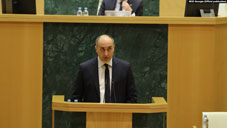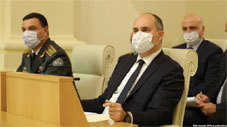
Defense Minister discusses ongoing reforms in the framework of Ministerial Hours
By Nika Gamtsemlidze
Friday, May 14
In the framework of Ministerial Hour of the Parliament of Georgia, Minister of Defense Juansher Burchuladze addressed the legislative body and answered MPs’ questions. While visiting the parliament, the minister discussed the ongoing reforms in the system, including the measures taken to strengthen the air defense capabilities of the country.
The minister discussed the active cooperation with the representatives of Israel's largest military industry.
According to the minister, the country will receive Rafael Advanced Defense Systems by the end of the year. “It is also planned to purchase a modern portable anti-aircraft missile system, which will be used to equip the maneuvering units,” said the minister and added that it would make the tactical units of the Georgian Defense Forces more efficient.
Burchuladze also spoke about the agreement with France and the ongoing negotiations. According to him, under this contract, the Defense Forces already have French-made air surveillance radars, mobile command posts, and Mistral-3 type missiles with fire engines.
“We will introduce a modern management, control and communication (C3) system, which will facilitate future integration into the integrated management and control system in NATO,” the minister said. According to him, the second phase of the French contract will be completed this year.
He also spoke about the creation of local production of unmanned aerial vehicles. “We are in active talks with South African and Polish companies to set up a joint venture for small and large unmanned aerial vehicles at Delta,” he said. According to him, it’s planned to sign a relevant agreement this year and launch products in 2022.
According to Burchuladze, important steps are planned in terms of strengthening the combat capability of the Defense Forces, both to acquire equipment and to create production opportunities. “Specifically, negotiations are underway with NATO countries to clarify the technical details in support of Defense Forces 2030,” the minister said.
According to the Minister, in the light of the existing challenges, it is especially important to consolidate the society and unite around common security goals. Burchuladze noted that the aggressive actions of the Russian Federation significantly undermine “the architecture of global security.”
According to Burchuladze, only coordinated action, maximum public involvement, and effective use of available resources can increase the responsiveness to military aggression and limit the possibility of intervention by the enemy.


